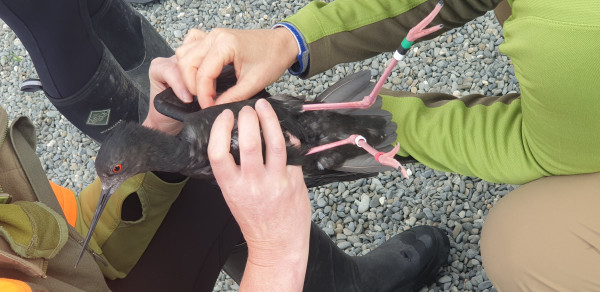Kakī and other taonga manu vulnerable to an outbreak of avian influenza
Sept 13, 2024
Ngāi Tahu is partnering with the Department of Conservation to protect taonga manu from a potential outbreak of bird flu (avian influenza).
If bird flu reaches Aotearoa, it is likely it would arrive via migrating birds. Our rare taonga species such as kakī (black stilt) would be particularly vulnerable to the highly pathogenic avian influenza (HPAI) virus, also known as H5N1.
While New Zealand, Australia and the Pacific currently remain free of the H5N1 strain of HPAI, it is spreading internationally in wild birds and has reached Antarctica. The virus has also spread to marine mammals and domestic birds such as poultry in some locations. HPAI does not spread through the air but via direct contact between infected and healthy birds or through contaminated equipment or materials including water and feed.
Rynee de Garnham, Ngāi Tahu representative on the Kakī Recovery Programme, says that because the population of kakī is so small, the arrival of H5N1 has the potential to be devastating.
“With only 167 manu in the wild, kakī are extremely vulnerable to any new disease,” Rynee de Garnham says.
Kakī are one of five endangered species of manu, alongside takahē, tūturuatu (shore plover), kākāpō, and red-crowned kākāriki (as a surrogate for kākāriki karaka) which have been included in a controlled HPAI vaccine trial. These species were included in the trial because of their critical conservation status and reliance on captive breeding for their survival.
A small number of manu of each species in captive facilities have been given two doses of the vaccine at least one month apart.
Rynee de Garnham was present when some kakī received their second dose of the vaccination.
“Kakī are an interesting manu to vaccinate as they are very slender and there is only one suitable spot on their body for the vaccination, but they have all handled it like champs,” she says.

Kakī receiving health check before vaccination
The second phase of the vaccine trial involves regular health checks of the vaccinated manu, including taking blood samples, and this will continue until July 2025. None of the birds have shown any adverse reaction to the vaccine and initial tests have detected antibodies in all five species.
If the vaccine proves effective it could be used if HPAI does reach our shores.
It is important for whānau to be vigilant and maintain careful hygiene practices when working with manu or other animals to help prevent the spread of disease:
· Wear disposable gloves and wash your hands after handling wild birds or poultry.
· Clean your footwear and change your clothes after being in contact with wild birds or poultry.
· Keep sick and healthy birds separate.
· If you see three or more dead or dying birds, marine mammals or other wildlife, report it to Biosecurity New Zealand by calling 0800 80 99 66.
· Do not touch or attempt to move any dead or dying wildlife.
Although it is difficult for humans to catch HPAI, the mortality rate is high for those who do get infected at over 50 percent.
For more information on avian influenza, visit the Department of Conservation website.